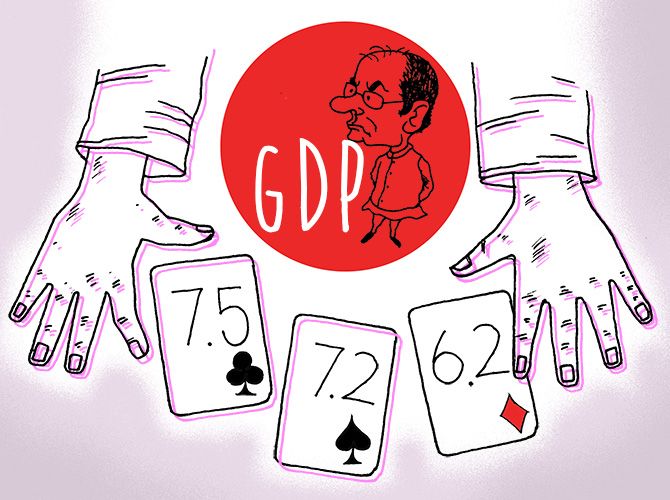 | « Back to article | Print this article |
'The estimates of tax forgone on this item run into hundreds of billions.'
'And there is neither fairness nor rationality to support continuing with this tax holiday for just one class of investors, those who put their money in shares,' says T N Ninan.

Illustration: Dominic Xavier/Rediff.com
The finance minister may well be right in the three claims that he made while taking part in a parliamentary debate on January 4: That reforms like the goods and services tax will pay off in the medium and long term; that India has been the fastest-growing large economy for three years; and that some recent economic data point to an upswing in economic activity.
Unfortunately, none of these will mitigate the complexity of the challenges facing him as he prepares his fifth, and this government's final, Budget.
First, there is oil -- whose prices have risen to $68 per barrel, a level that no one had anticipated.
The impact on domestic oil prices and broader inflation, on the Budget if taxes on petro-products have to be reduced, and on the trade deficit, will become clear over time.
The dangers are not as yet such as to threaten macro-economic stability, as has happened in the past, but they will impact growth.
This will be the obverse of the growth bonus that the country got in 2014-2016 when oil prices fell from around $110 at the time that Narendra D Modi got elected, to a trough of $30 two years ago.
GDP growth peaked at 7.9 per cent in 2015-2016.
Higher inflation today is threatened also by higher food prices, making it impossible for the Reserve Bank to cut interest rates in the foreseeable future.
A higher-than-planned fiscal deficit, which seems to be on the cards, will add to the already rising curve of general government (Centre + states) deficits and possibly raise bond rates higher than their already elevated levels.
Costly money mitigates against faster growth.
The 'advance' GDP figure (essentially, the official forecast) for the current financial year, projecting growth at 6.5 per cent, has come up short of earlier expectations of 6.7 per cent.
Next year's growth rate is likely to fall short of the 7.4 per cent predicted by the International Monetary Fund, but should cross the 7 per cent threshold -- helped by the benefit of a low base and by a nascent recovery in exports.
While that would be a matter of relief, the fact is that investment continues to flag at levels last seen well over a decade ago, and the consumption curve is in danger of flattening.
So there would be little reason to expect great revenue buoyancy, required if the government is to get the headroom for announcing some pre-election year giveaways.
Expenditure control must therefore remain the name of the game -- especially since it is not clear when slack GST revenues will climb back to the budgeted level of Rs 910 billion per month, with a further growth additive for next year.
This less-than-rosy scenario for a year that everyone had hoped would mark a change of mood and performance, after a period of disruption, demands that the finance minister look for revenue sources that have not been tapped so far.
The most obvious of these is long-term capital gains on shares, to match the tax on capital gains accruing from other classes of assets.
The estimates of tax forgone on this item run into hundreds of billions, and there is neither fairness nor rationality to support continuing with this tax holiday for just one class of investors, those who put their money in shares.
Such a tax would not be free of risk. The potential impact on the stock market is obvious, and overseas investors might choose to look elsewhere.
If the impact is severe, the negative wealth effect will affect consumption, and therefore growth.
However, there are ways of dealing with both risks -- for instance, by offering inflation neutralisation plus a deferred and phased introduction, designed so that the incremental tax burden in any given year will be small enough to not upset the market or drive away investors.
The introductory tax rate could be as low as 3 per cent, going up to 10 per cent in two stages over as many years.